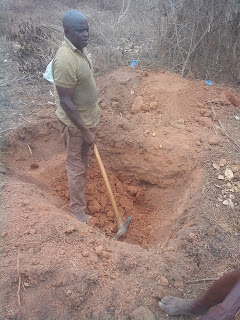National Dairy Production Output To Rise To 1.1m Metric Tons By 2015 - Minister.
The Minister of Agriculture and Rural Development, Dr. Akinwumi Adesina has said that government will increase the National Dairy Production from its current 469, 000 metric tons to 1.1 million metric tons by attaining an average milk yield per lactating cow from below 500 litres to 2,000 litres per lactation by 2015.
The Minister made this known at the opening session of a one-day training workshop on hygienic milk collection techniques and data collection for dairy value chain desk officers of the 36 states of the Federation held at the Livestock Training Centre Kachia, Kaduna state on the 22nd November, 2013.
Dr. Akinwumi who was represented by the North- West Zonal Director, Dr. Leo Nyam, said the objective of the training was to sensitize the Desk Officers on the activities of the value chain, Hygienic Milk Collection Techniques and data collection as well as their roles toward the achievement of Growth Enhancement Support Scheme (GES) of the Dairy Value Chain.
The Minister made this known at the opening session of a one-day training workshop on hygienic milk collection techniques and data collection for dairy value chain desk officers of the 36 states of the Federation held at the Livestock Training Centre Kachia, Kaduna state on the 22nd November, 2013.
Dr. Akinwumi who was represented by the North- West Zonal Director, Dr. Leo Nyam, said the objective of the training was to sensitize the Desk Officers on the activities of the value chain, Hygienic Milk Collection Techniques and data collection as well as their roles toward the achievement of Growth Enhancement Support Scheme (GES) of the Dairy Value Chain.
Dr. Adesina also informed the gathering that one of the goals of the Dairy value chain is to raise the household income of dairy producers by at least US $285 million (30% import substitution in 2014).
In his speech, the Desk Officer of Diary value chain Dr. Frank Abudei gave the overview of the Diary value chain hinting that Nigeria has the largest cattle population in West Africa of 14 million with an estimated number of about 900,000 milking cows, a market demand of 1.3 million tons of milk valued at N450 billion (CBN 2010) and a growth rate of 4.4% predicted for 2011-2016.
Dr. Frank Abudei also informed the gathering that the total milk supply in 2010 was 600,000MT which is largely imported, and the country still has a huge gap between supply and demand of milk and milk products estimated at 700,000MT in 2010. This inability to contribute significantly to domestic milk supply and also bridge the demand supply gap is due to low input, low output livestock production system, poor productivity of predominant cattle breeds, low investment, low value addition and poor market development.
The Diary Value Chain Transformation Agenda of the Federal Ministry of Agriculture seeks to redress these challenges, through structural shift which focuses on issues relating to productivity, value addition and market development along the livestock value chain.
He also said, the expected impact include the creation of over two million jobs both on and off farm in the production, manufacturing and marketing sectors of the Nigerian Diary industry. This would save the nation over US$400 million expended annually in the importation of milk and milk products, increase the income of estimated 12 million livestock farmers from the current average level of less than 2 litres of milk per cow per day to 10 litres per cow per day and the creation of strong supply chain to the industry.
The desk officer also re-iterated the achievement of the value chain in 2013, that in this year 2013, about 2,835 MT out of targeted 14,100 MT of domestic raw milk have been collected from 5 milk collecting centres established in Oyo state for processing in partnership with Friesland Campina (WAMCO) and contribution from Milcopal cooperative in Kaduna and L&Z in Kano state.
He also said, the GES in the Dairy value chain in 2013 was successful, in which about 6,637 indigenous cattle have been inseminated free of charge, out of a targeted total of 12,400 cows in eight states of the Federation with 50% of them being pregnant and the exercise is still ongoing. In order to increase productivity 775 dairy farmers have been registered in seven states and FCT in which 1,550MT of feed have been provided under Growth Enhancement Support Programme (GES) for distribution to the registered farmers to purchase at 50% discount.
Lecture presentation on Hygienic Milk Collection Techniques and Data Collection was delivered by Dr. Muhammad Zailani of International Fertilizer Development company (IFDC).


This is excellent information which is shared by you. This information is meaningful and magnificent for us to increase our knowledge about it. Keep sharing this kind of information. Thank you. Read more info about dairy consulting Vietnam
ReplyDelete